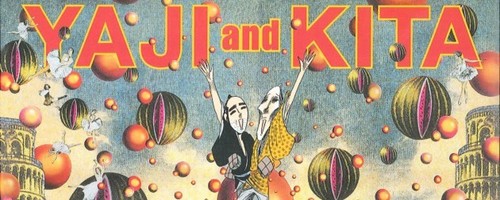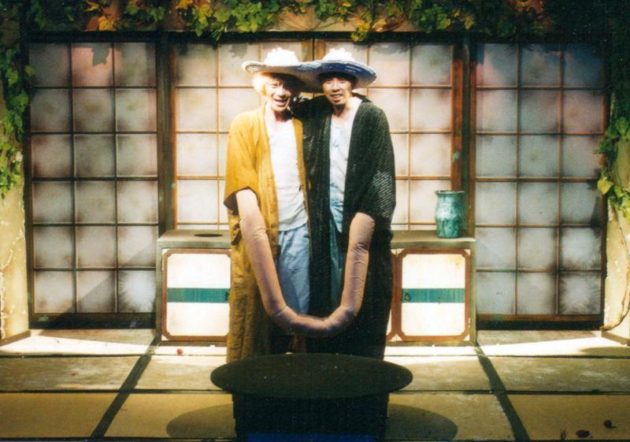Tengai Amano 天野天街 (Playwright and director)
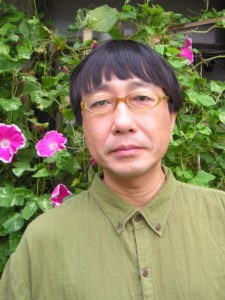 Tengai Amano is a playwright, director and the leader of the drama group called “Shonen-oja-kan (少年王者館)”. He was born in Ichinomiya, Aichi prefecture in 1960, and graduated from the Department of History in Aichi Gakuin University. In 1982, he founded “Shonen-oja-kan” in Nagoya. The group started performing all over Japan, including Tokyo, Osaka and Nagoya since 1984.
Tengai Amano is a playwright, director and the leader of the drama group called “Shonen-oja-kan (少年王者館)”. He was born in Ichinomiya, Aichi prefecture in 1960, and graduated from the Department of History in Aichi Gakuin University. In 1982, he founded “Shonen-oja-kan” in Nagoya. The group started performing all over Japan, including Tokyo, Osaka and Nagoya since 1984.
As one of the busiest directors in the country, Amano has been active nationwide and has directed in numerous other drama groups as a guest, as well as writing and directing for his own theatre group for almost 25 years. Besides drama, he has also produced dance, puppet shows, concerts, and fashion shows, and he has been involved in various kinds of stage arts for a long time.
Another of his life works is illustration; designing of posters, CD covers and book covers, and writing comics, and they are highly appreciated in all fields. The flyer for “YAJI and KITA” was also designed by him.
Amano’s creativity has extended to filmmaking. In 1994, his directorial debut short film called “TWILIGHT” won the grand prize of the International Short Film Festival Oberhausen and the Melbourne International Film Festival (Short Film Programme), and with this movie he drew worldwide attention in the filmmaking field. In 2006, he plans to make two movies from stories by Japanese writers, “Neji-shiki (by Yoshiharu Tsuge)” and “Ningyo-no- nageki (by Jun’ichiro Tanizaki).”
Awards
1994 Short film “TWILIGHTS” won the grand prizes at the International Short Film Festival
Oberhausen (Germany) and the Melbourne International Film Festival (Australia)
1996 Nagoya Junior Chamber Inc. The Admirable Rising Generation Cultural Award
1997 Nagoya city Art Award Premium Prize
1998 Individual Category, Japan Internet Drama Award
2005 9th Matsubara Eiji & Wakao Masaya Commemoration Play Prize
2006 Nagoya Theater Pen-Club Prize
Kotobuki Shirigari しりあがり寿 (Writer of the original comic)
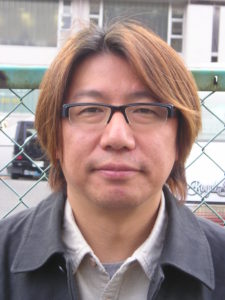 The comic artist, Kotobuki Shiriagari, was born in Shizuoka city in 1958. After graduating from Tama Art University in 1981, he started working for Kirin Brewery CO., LTD. In 1985, he published his first book “Erekina-haru”. He continued drawing comics while still working for Kirin. Then in 1994, he retired from Kirin and became a full-time comic artist. In 2000, he won the 46th Bunshun Cartoon Prize. In 2001, His “Mr. Yaji and Mr. Kita in Deep” won the grand prize in the 5th Osamu Tezuka Cultural Prize and earned him international recognition. In January 2006, he was officially invited to the Angoul?me Comic Festival (France) which is called as the “Cannes International Film Festival of the comic world.” He also held a solo exhibition at the festival.
The comic artist, Kotobuki Shiriagari, was born in Shizuoka city in 1958. After graduating from Tama Art University in 1981, he started working for Kirin Brewery CO., LTD. In 1985, he published his first book “Erekina-haru”. He continued drawing comics while still working for Kirin. Then in 1994, he retired from Kirin and became a full-time comic artist. In 2000, he won the 46th Bunshun Cartoon Prize. In 2001, His “Mr. Yaji and Mr. Kita in Deep” won the grand prize in the 5th Osamu Tezuka Cultural Prize and earned him international recognition. In January 2006, he was officially invited to the Angoul?me Comic Festival (France) which is called as the “Cannes International Film Festival of the comic world.” He also held a solo exhibition at the festival.
He is one of the most energetic comic artists. While holding exhibitions of his work, he has been drawing serial comic strips in daily newspapers and a variety of magazines. He also writes novels, essays and outlines for computer games. On the other hand, he also appears in plays and directs movies. Because of plenty of his borderless works, he attracts attention form various fields. In 2005, Kankuro Kudo, one of the most famous film directors in Japan, made the film version of “Mr. Yaji and Mr. Kita in Deep”, which is going to be released all over the United States in 2006.
Awards
2000 46th Bunshun Cartoon Prize
2001 5th Osamu Tezuka Cultural Prize Excellent Prize
Reviews
“Going back and forth rapidly between reality and fantasy, “YAJI and KITA” takes you to a strange nightmarish world. It is also a world full of jokes using various visual and audio effects. However, the jokes are not merely for laughter. Its chaotic and surrealistic development shakes your sense of reality and you are faced with a question of what is real and what is not. A sense of life hanging in the air, never moving further however hard you try to go ahead, and a sense of death existing close with life are thrown right in your face. Watching “YAJI and KITA” was an extraordinary experience which overturned a history of drama and provided me with a trip to a profound world of hilarious fun and jokes.”
? Jun Ohmi, Mainichi Newspaper, March 2005
“Turning a nightmare straight into ecstasy, “YAJI and KITA” was an incredibly magnificent two-actor play. Amano displayed his masterly technique of repetition and collage to create the feeling that reality is crumbling from beneath your feet. Effects using vision, sound, lights, properties and stage sets came together with a miraculous speed and marvelous accuracy. Two competent actors united with them perfectly and brought “YAJI and KITA” to the next level.”
Kyoko Azumi, Chunichi Newspaper, July 2003
“While not following every step of the original work, it brings in both the essences of the classic Japanese tale and the subsequent comic book, Amano succeeds in making the play as strong as the original. Created after breaking the original into pieces and putting them together again, “YAJI and KITA” unites not only “life and death” but every kind of opposite ends with an extraordinary imagination, translating the world into something new, and displaying the true nature of reality.”
Momiichi Unita, production programme, 2005
“If you are a fan of Kurosawa films or novels by Haruki Murakami, you surely will enjoy this Japanese drama on the road, “YAJI and KITA” Skilled performances by the two actors and magnificent stage effects with multimedia have created an amazing work. The most important parts are, however, the playwright and director Tengai Amano’s serious views of the reality of society and his unusual imagination in the field of drama.”
Beijing Youth Daily, October 2003
““OSHIMAI” a production of KUDAN Project in Beijing in 1993, has become a legend in China. Audiences must have been deeply fascinated by the new dramatic style of “YAJI and KITA” Actors ordering food on stage by telephones was of course surprising to the audience but what was shocking is when they then learned that the deed was only a preparatory step for discovering the true nature of the world.”
? Beijing Times, October 2003
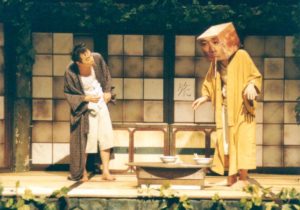 The KUDAN Project production of “YAJI and KITA” was first performed in 2002. The encounter of talent from two different genres, comic and theatre, became big news and it brought a number of people to theatres. Surprised audiences praised the stage production as a totally new theatre experience, and it was nominated for several prizes for the best play of the year.
The KUDAN Project production of “YAJI and KITA” was first performed in 2002. The encounter of talent from two different genres, comic and theatre, became big news and it brought a number of people to theatres. Surprised audiences praised the stage production as a totally new theatre experience, and it was nominated for several prizes for the best play of the year.

